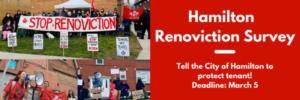Tell the city to protect tenants from renoviction!
Posted February 21, 2023

The City of Hamilton is seeking feedback on the scale of the renoviction issue and what can be done to protect tenants. Have your say! The survey runs until March 5th. Read below for more background information on renoviction, ACORN Hamilton’s campaign and find the link for the city’s survey.
What is renoviction?
By renoviction we are referring to the tactics or legal efforts that lead up to a tenant being forced to move out of their home under the guise of major renovations.
Without provincial vacancy control (cap on rent between tenancies), financialized landlords are determined to get frequent turnover of units to raise the rent or get rid of tenants paying below market rent.
Why are provincial rules inadequate in protecting tenants?
In Ontario, landlords have the ability to secure vacancy of a unit for renovations by issuing a N13 (reason 2). If filed at the Landlord and Tenant Board, the landlord must demonstrate that the eviction is in good faith. Tenants have first right of refusal after renovations to return to the same unit at the same rent. Tenants can also pursue fines if the landlord rents out the unit to another tenant.
Despite these provincial regulations, it is very difficult for low income tenants to exercise their first right of refusal and maintain their affordable housing. And if the landlord rents out the unit to another tenant, there is no way for tenants to get their unit back.
ACORN Hamilton’s demands:
1. A city-wide landlord licensing program to ensure healthy housing conditions and restrict renoviction (Based on the RentSafe program from Toronto, Ontario and anti-renoviction policy based from New Westminster, BC).
- The burden of tenant placement is put on the landlord. If landlords want vacancy for renovations they must accommodate tenants in alternative housing (comparable size and location) for the duration of the work at the SAME rent OR with the tenant’s agreement enter into a new lease at a different but similar unit at the SAME rent.
- Moving assistance (tenant’s choice of an insured moving company arranged by the landlord OR compensation).
- Extra support for vulnerable tenants (transportation to temporary housing unit and packing assistance for those with mobility impairments).
- Any tenant engagement and required tenant meetings must include a representative from the City of Hamilton and community groups that support tenant rights if requested (Hamilton Community Legal Clinic, ACORN).
- All written communication to tenants must be translated with common languages spoken by tenants in the buildings, and translation services must be provided at tenant meetings.
- Building maintenance must continue after a notice of renovations.
- Frequent communication to tenants during the renovations to share timeline on returning to units
- Annual inspections to apartment buildings should include proactive tenant education (information communicated / left at doors informing tenants of their rights and available city programs and contact information for community groups ie. ACORN and the Hamilton Community Legal Clinic)
2. Tracking when apartment buildings are sold (transfer of licence) and immediate proactive tenant outreach to inform tenants of their rights and the City of Hamilton’s anti-renoviction rules
3. Improvements to the Tenant Defense Fund
- Expand the Tenant Defense Fund to cover N12s and group tenant maintenance applications (T6).
- Expand annual funding of the Tenant Defense Fund (increase funding available for tenants and investment in a tenant outreach component of the program).
- Create a vetted list of paralegals that have expertise and experience in representing tenants in AGIs, N13s, N12s and T6s to be shared with tenant groups.
- Long term: investigate the feasibility of following in the footsteps of the City of Toronto Tenant Defense Program (now called Tenant Support Program) where under the new program, tenant groups can directly access legal services from a designated legal organization (Canadian Centre for Housing Rights).
Tips for filling out the survey
- Make sure to let the city know that current provincial rules are not protecting tenants and allow tenants to be evicted for renovations. Displaced tenants cannot afford current market rents
- Renoviction is a big issue impacting all parts of the city. While there is no current tracking by the city of N13s or buyouts, ACORN has seen a large increase in tenants contacting us regarding the issue and there was a big spike in N13s filed at the Landlord and Tenant Board between 2012 to 2021 (In 2012, the number of N13s filed with eviction applications was six. Two years ago, there were 33, and last year the total jumped to 76, according to data from Tribunals Ontario)
- The survey doesn’t allow for tenant facing renoviction but not yet displaced to share that status. Feel free to add it to the last question where long answers are allowed.
- Tell the city you support ACORN’s demands for the city to protect tenants from renoviction: city wide landlord licensing, improvements to the tenant defence fund and a proactive tenant education program
***CLICK HERE TO FILL OUT THE SURVEY: https://ec-cc.typeform.com/to/NMxs8zpT ***
SAVE THE DATE APRIL 20TH – Based on the consultant’s findings, Housing Services staff will take a recommendation report on this issue to the April 20, 2023 Emergency and Community Services Committee for discussion and direction.
Want to get involved in ACORN’s campaign? Reach out!
hamilton@acorncanada.org / 905-393-5734
